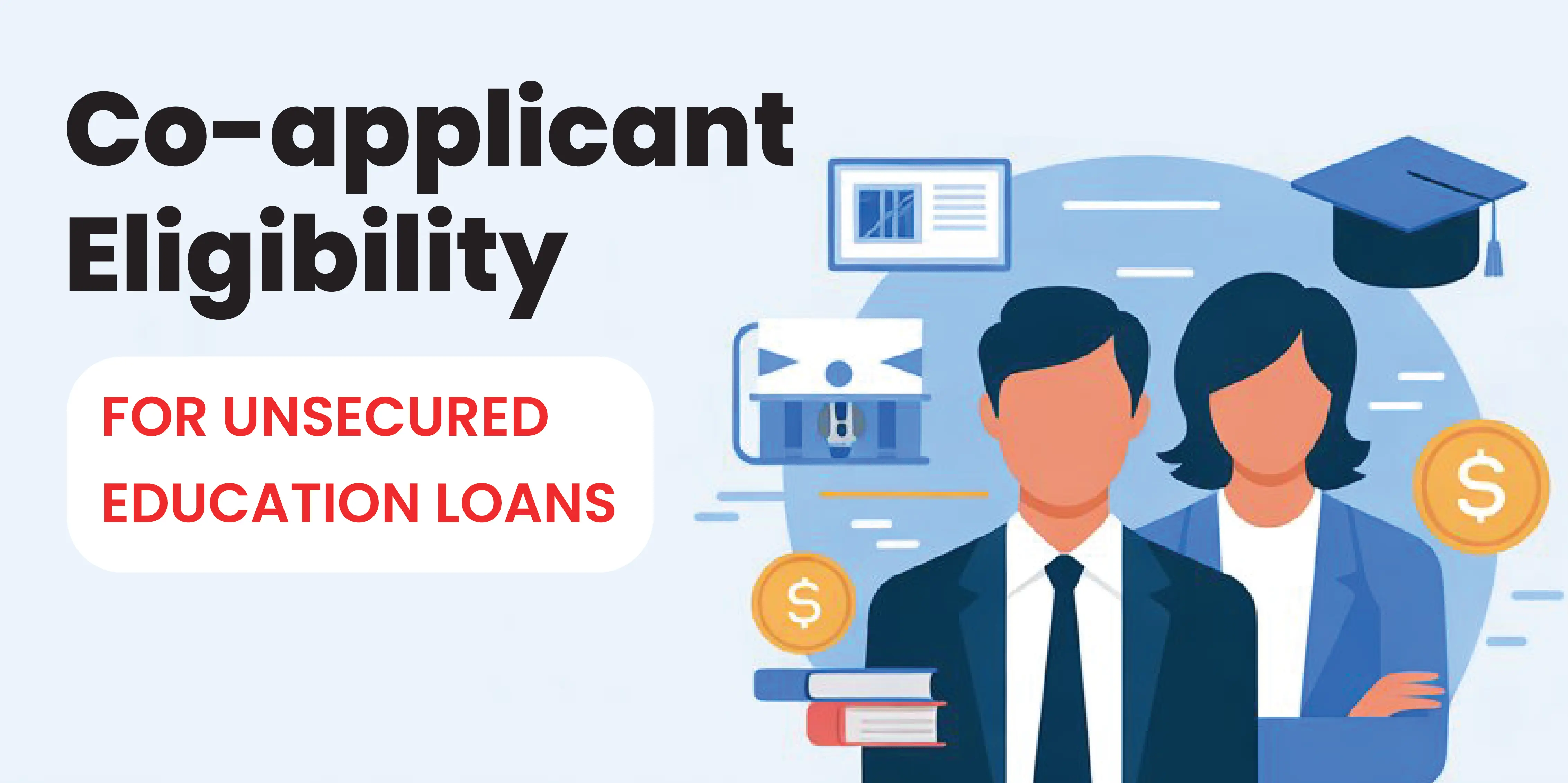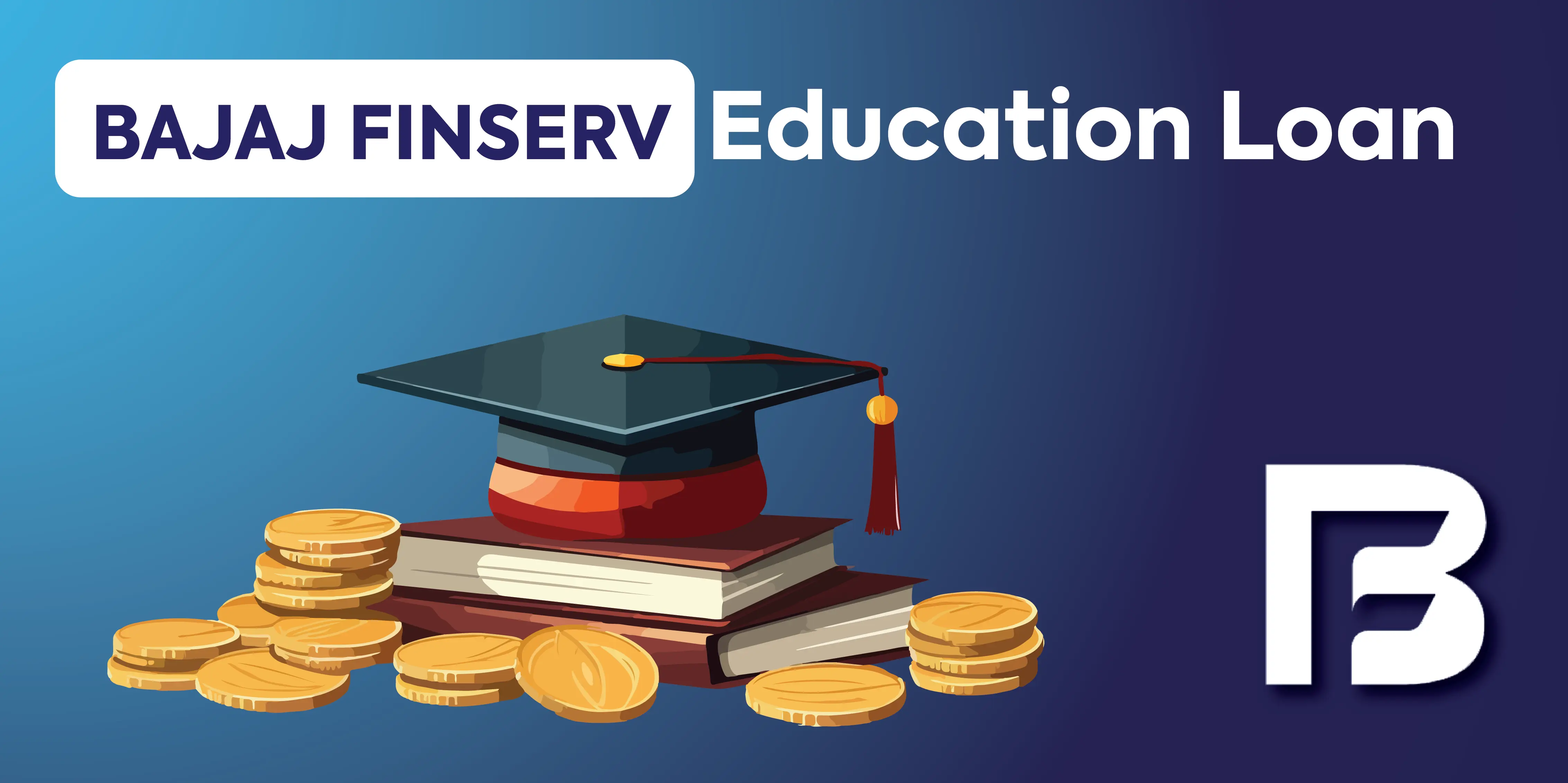https://www.wemakescholars.com/blog/co-applicant-eligibility-criteria-for-unsecured-education-loans
Co-applicant Rules & Eligibility for Unsecured Education Loans 2025
Private Banks/NBFCs | Updated on ()

An education loan without collateral is one of the most sought-after sources of higher education funding in India. One of the biggest highlights of any unsecured education loan scheme is the fact that borrowers are not required to pledge collateral security. However, the lenders are very stringent about the co-applicant eligibility, as no security is involved in these loans.
This article will give you detailed information about the co-applicant eligibility criteria set by the NBFCs and private banks that lend for higher studies. This will help you plan your higher education loan process effectively.
Who is a co-applicant?
A co-applicant or a co-borrower, or a co-signer is someone with a good financial profile who jointly signs the education loan agreement with the primary applicant, basically, the student. In short, the co-applicant shares equal responsibilities of repaying the loan.
This means they become the primary contact if the student faces any issues in repayment. A coapplicant could be a self-employed or a salaried person. Primarily accepted co-applicants are parents, spouse, parents-in-law, or a guardian.
|
Lenders |
Accepted as co-applicants |
|
Private banks |
Parents / Parents-in-law, Siblings, Spouse |
|
NBFCs |
Parents / Parents-in-law, Siblings (preferable brother over sister), Spouse, Brother-in-law, Parents siblings, First cousins |
Is a co-applicant important in unsecured education loans?
Yes, a co-applicant is most important in unsecured education loans. In almost all education loans, a co-applicant is mandatory except in a few cases. A co-applicant enhances the profile of the primary co-applicant, guarantees the loan repayment.
Generally, students who apply for education loans do not have any income source to repay the loan. This is where a co-applicant takes the responsibility and assures the lender of the repayment.
What are the types of co-applicants in Education Loans?
There are two types of co-applicants: 1. Primary co-applicant, 2. Financial Co-applicant
1. Primary co-applicant
The primary co-applicant is often the parents, regardless of their financial background. Some financial institutions even allow students to include a retired individual or someone with a steady income as a primary co-applicant for secured education loans.
2. Financial co-applicant
If the primary co-applicant doesn’t have a proper income source, some banks may accept others as a financial co-applicant. They need to have an appropriate source of income. First cousins, own family members, paternal or maternal uncles, can be financial co-applicants.
Important Factors for the Co-Applicant’s Eligibility Criteria
The co-applicant role is important in an education loan. Below are some of the key factors that lenders primarily consider when assessing the profile of the co-applicant.
- CIBIL Score:
- This is the primary parameter that the lender checks while assessing the eligibility of the co-applicant. A good CIBIL score can improve the possibility of getting an education loan. The ideal CIBIL score to get an education loan would be a minimum of 700 and above.
- The better the CIBIL score, the higher the chances of getting an education loan. Therefore, it is recommended that individuals maintain a good CIBIL score if they want to support the co-applicant.
-
IT Returns Document:
- The income tax return document is a crucial requirement for an education loan. Financial institutions, including public, private, and NBFCs, are very particular about submitting the Co-applicants' IT return documents.
- Especially if the student is opting for an unsecured education loan, the ITR document is a must.
-
Income of the co-applicant:
- Lenders consider various factors to determine the eligible loan amount for the primary co-applicant. The income of the co-applicant is one of them.
- The minimum income required to be a co-applicant is 30,000 INR. Per month. This excludes all other financial obligations of the co-applicant.
-
Income proof:
- If the co-applicant is self-salaried, the last six months' salary slips are to be submitted. Some financial institutions also ask for a bank statement.
- If the co-applicant is running a business, they will be required to submit additional documents, which will be discussed in the documents section.
-
FOIR Norms:
- Financial obligations to Income ratio(FOIR) is another important factor that lenders check to assess the eligibility of the co-applicant. This is also called the debt-to-income ratio. It is the ratio of the total income to the financial obligations of an individual.
- A FOIR below 40% i generally considered to be healthy. Low FOIR also indicates that the co-applicant has the capacity to repay the loan. A higher FOIR above 40% means a significant portion of your income is already committed to repaying the debts. This reduces the chances of getting an additional loan from the lenders.
Difference between a Co-applicant and a Guarantor
Guarantor: In collateral education loans, if the primary co-applicant is not the collateral owner, then the collateral owner has to be added to the loan as a guarantor. A guarantor can be anybody ready to pledge collateral against the loan amount.
Key Differences:
|
Details |
co-applicant |
Guarantor |
|
Role |
Shares equal responsibility of repaying the role |
Pledges collateral and assures loan repayment if the student defaults. |
|
Relation with the student |
Must have a proven relationship with the student |
Not necessarily a proven relationship |
|
Involves in |
Both secured and unsecured education loans |
Involves mostly secured education loans |
|
CIBIL Requirement |
A good CIBIL score is mandatory |
An average CIBIL score is enough |
|
Documents |
KYC documents and financial proof documents |
KYC and collateral documents |
|
Effects of loan default |
Affects the CIBIL score and the chance of taking loans in the future |
The lender can take legal action and the possession of the collateral involved |
Eligibility Criteria for Co-applicants in Unsecured Education Loans- Private Banks
Private banks offer a lot of benefits to borrowers of their unsecured education loans. Some of these benefits include a maximum education loan amount of up to 1Cr and a repayment period of 15 years. Let us take a look at the co-applicant eligibility criteria, which individuals need to fulfil to be eligible for an education loan.
Education loan eligibility criteria for co-applicants (for secured education loans):
-
The co-applicant should be a citizen and a resident of India.
-
The co-applicant must have a stable source of income and should be a regular taxpayer.
-
The co-applicant should have a CIBIL score of 700 and above to qualify for an education loan for abroad studies.
Documentation to be submitted by co-applicants for an unsecured Education loan - Private banks
Below are the documents required for a co-applicant for secured loans in private banks
Salaried co-applicant
- KYC documents
- Three months of salary slips
- Six months of bank statements
- 2 years of ITR or Form 16
- Current financial obligations documents
- Two recent passport-sized photographs
Self-employed co-applicant
- KYC documents
- Latest 1-year bank statement
- Last 2-3 years of ITR
- 2-3 years of profit/ loss account and balance sheet
- Business proof (GST registration. Shop, municipal license
- Current financial obligations documents
- Two recent passport-sized photographs
Note: The eligibility criteria and the documentation of the co-applicant may vary from lender to lender based on the requirements and profile of the student.
Eligibility Criteria for Co-applicants in Unsecured Education Loans- NBFCs
No education loan process can commence without the presence of a co-applicant, especially for unsecured education loans. Since these loans do not require candidates to pledge security of any kind against their education loans, it is all the more necessary to name a co-applicant to avail of an unsecured education loan.
-
The co-applicant should be related to the student by blood. Preferably, co-applicants are parents, siblings, and, in rare cases, immediate relatives can also be considered.
-
The co-applicant should have a steady source of income. They can either be self-employed or salaried professionals. In either case, the co-applicant must have a concrete financial profile.
-
The co-applicant should have filed their ITR for at least two years before applying for an unsecured education loan. Relevant documents showing proof of the same have to be submitted to the lender at the time of applying for an unsecured education loan.
-
The co-applicant should have a good CIBIL score, preferably 700 and above, to apply for an unsecured education loan.
Education loan documents related to the co-applicants’ financial records
-
If the co-applicant is a salaried professional, then salary slips issued in the past 3 months have to be provided for the purpose of processing the unsecured education loan application.
-
If the co-applicant is self-employed, their bank account statement for the previous 6 months has to be provided.
-
ITR documents of the previous 3 years to be provided by the co-applicant, regardless of whether they are self-employed or salaried professionals.
Note: The eligibility criteria and the documentation of the co-applicant may vary from each lender in NBFC, based on the requirements and profile of the student.
Having a thorough understanding of the co-applicant eligibility criteria is an added plus if you plan on funding your higher education with the help of an education loan without collateral. If you require a thorough rundown of the complete details, do get in touch with the WeMakeScholars financial team at the earliest opportunity.
Tip to choose a good co-applicant
-
Choose the co-applicant with a stable income.
-
Prefer co-applicants with good credit scores.
-
Make sure to check the FOIR of the coapplicant, which must be less than 40.
-
Collect all the necessary documents of the co-applicant as requested by the lender.
-
Seek expert advice to avoid loan rejection chances.
Benefits of applying Via WeMakeScholars for unsecured education loans
Applying education loan on your own can be a little complicated, especially for unsecured education loans. This involves complex documentation work, multiple visits to the bank, poor customer service, lack of knowledge on loan terms. Going through WeMakeScholars can help you get you education loan without any hassle. Some of the benefits are:
- Expert Advice, regarding co-applicant documents
- End-to-End Support
- Faster Processing Time
- Negotiation Support
- Digitalized Process
How to apply for an education loan with a co-applicant through WeMakeScholars
Below, clear steps are mentioned on how to apply for an education loan with a co-applicant.
Online Process through WeMakeScholars
-
Fill in the details in the application form on our WeMakeScholars website.
-
Once you submit the application form, our Financial Officer will contact you.
-
Provide all the details regarding your loan and the co-applicant's details.
-
Our Financial Officer will analyse your profile and check your and your co-applicant's eligibility.
-
After this step, submit your documents and the co-applicants' documents in the link shared by your financial officer on our WeMakeScholars website only.
-
Your file will be logged in. Once the login is created, you can check your loan application status.
-
You will get your loan sanction letter as early as possible.
You can always contact your financial officer to know about your education loan status.
Conclusion
A co-applicant is important for an unsecured education loan. This blog covers everything you need to know about the eligibility requirements for a co-applicant for unsecured education loans. Knowing the eligibility of the co-applicant can help students choose the right one.




Kindly login to comment and ask your questions about Scholarships & Education Loans